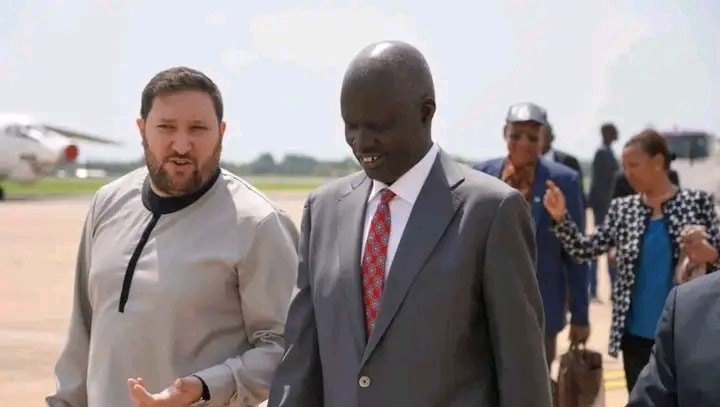A high-level African Union (AU) delegation arrived in South Sudan’s capital, Juba, on Sunday amid escalating political and security tensions that threaten to derail the country’s fragile 2018 peace agreement, raising fears of a return to full-scale war.
The delegation, sent by the AU Peace and Security Council, was received by Ambassador Kureng Pac, director general for multilateral cooperation at South Sudan’s foreign ministry. Their three-day mission, which runs through Tuesday, comes as diplomatic efforts intensify to salvage the faltering Revitalized Agreement on the Resolution of the Conflict in South Sudan (R-ARCSS).
Upon arrival, the delegation met with civil society groups and faith-based leaders, who presented urgent demands to prevent further crisis and resume inclusive dialogue in South Sudan.
Sources familiar with the discussions told Radio Tamazuj that the civil society proposals included convening an all-parties meeting to revive the peace deal, releasing detained opposition officials, reinforcing the ceasefire, and holding elections as scheduled to resolve the political deadlock.
Civil society representatives specifically called for the release of First Vice President Riek Machar, leader of the Sudan People’s Liberation Movement-in-Opposition (SPLM-IO), who has been under house arrest since March 26.
The visit follows the AU council’s recent warning about South Sudan’s deteriorating situation, citing repeated ceasefire violations, political detentions, and eroding trust among former warring factions.
The delegation is expected to meet senior government officials on Monday, though skepticism remains over whether Machar’s faction will participate.
The AU’s mission aligns with growing frustration from Western nations. On Wednesday, embassies including those of the United States, Britain, Canada, Germany, Japan, the Netherlands, and Norway issued a joint statement demanding the release of detainees and condemning rising violence and attacks on aid workers, warning of a potential return to widespread conflict.
Before the delegation’s arrival, SPLM-IO acting chairman Nathaniel Oyet accused the AU of bias in a Facebook post, calling the visit a “mission of banquet” and alleging the AU serves only President Salva Kiir’s interests. Oyet vowed his group would pursue peace “on our own terms.”
Separately, in a letter dated Aug. 9 and seen by Radio Tamazuj, Oyet accused President Salva Kiir’s government of sabotaging talks by canceling a scheduled meeting between the AU and peace deal signatories.
Oyet said the move demonstrated Kiir’s “lack of political will” to end the crisis, writing: “The cancellation is yet another obstruction by President Salva Kiir to restore peace.”
He alleged his group had been “locked out” of consultations with the AU despite its role in the 2018 agreement and warned that any findings from the delegation’s visit would be skewed toward Kiir’s faction. “Reports from this visit will be one-sided,” Oyet wrote, urging the AU to disregard them.
South Sudan, which has never held general elections since gaining independence in 2011, postponed its planned vote last year to December 2026, further delaying its democratic transition.
The 2018 peace deal, signed by Kiir, Machar, and other leaders, ended a five-year civil war and established a unity government tasked with drafting a constitution, unifying armed forces, and preparing for elections. Yet nearly seven years later, key provisions remain unfulfilled.




